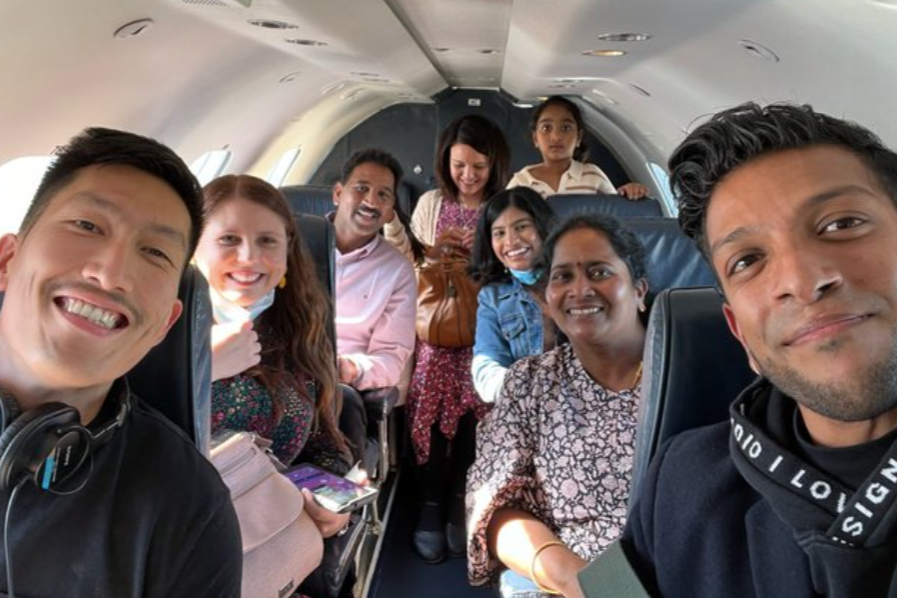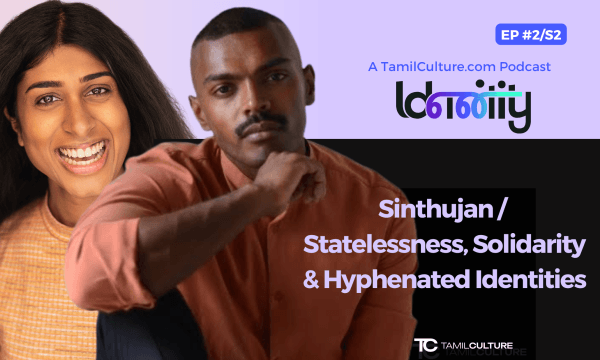
Imagine seeking refuge from your home country due to societal structures that perpetuate conflict instead of peace. Now, envision finding asylum in another country, falling in love, getting married, starting a family, and finally having the opportunity to create a home, only to have it abruptly taken away one fateful night. This is the heartbreaking story of the Nadesalingam family, narrated in the poignant 'You Have Been Told A Lie' podcast, created by Jay Ooi and Thinesh Thillainadarajah.
Date on your own terms! Join the other couples who have dated and married through myTamilDate.com!
 myTamilDate Success: A Gentle Push Towards Online Dating By Family Brought Céline & Santhous Together I knew after a couple of days of talking, he was the one. Santhous is a vibrant, energetic soul. TamilCulture.com
myTamilDate Success: A Gentle Push Towards Online Dating By Family Brought Céline & Santhous Together I knew after a couple of days of talking, he was the one. Santhous is a vibrant, energetic soul. TamilCulture.com I had the opportunity to listen to the first episode of the "You Have Been Told A Lie: The Birth Lottery" podcast before its airing on June 10, 2023. This date marked the first anniversary of the Nadesalingams' long-awaited return home after nearly four years in detention. After listening to the podcast, I had a conversation with Thinesh, the co-creator of the series, to delve into the details of episode one and hear his insights on the creation process. The "You Have Been Told A Lie" podcast is now accessible for streaming on various podcasting platforms.
Before going into my interview with Thinesh, let me briefly summarize the podcast series for those who may be unfamiliar. "You Have Been Told A Lie" revolves around the Nadesalingam family, highlighting their experiences as Tamil asylum seekers who were forcibly removed by the Australian Border Force from the regional community of Biloela in 2018 and subsequently detained for four years. Despite being granted bridging visas in 2022 that allowed them to return to Biloela, their journey was fraught with challenges and obstacles. Eventually, they secured permanent visas, but their path was far from easy.
The You Have Been Told A Lie podcast investigates the asylum-seeking process of Nadesalingam Murugappan (Nades) and Kokilapathmapriya Nadesalingam (Priya) from Sri Lanka to Australia and their subsequent experiences of being uprooted from their homes and detained by the Australian Border Force.
Additionally, the podcast uncovers various truths about the intricate factors that shape and impact Australia's immigration policies, exploring the underlying facts behind their development and implementation at both the global and national levels. Furthermore, it sheds light on the societal dynamics in Sri Lanka, particularly between the majority Sinhalese and the minority Tamils. These dynamics have often led Tamils to flee their homes for safety and refuge in other parts of the world.
Now that you're caught up, let's jump into the interview!
What is my Identity? It's a question that we all seek to answer in our own ways throughout our lives. Each episode of Identity spotlights a different creative, some from the Tamil community and some from outside it, who will be chatting about how we take ownership of our narratives, art, politics and of course who we are. We hope to inspire you through their unique stories of seeking and finding Identity. Episodes:
- Shakthi / Theatre, Intergenerational Trauma and Australian Tamil Identity
- Identity Podcast: Anuk/ Language, Grief and Tamil Community
- Maral/ Art, Belonging & Armenian-Iraqi-Canadian Identity
- Shuba/ Music, Feminism and Dual Identities
I asked Thinesh about the origins of the podcast series and his motivation to dedicate it to the Nadesalingam family.
Thinesh explained that conservative ideologies significantly influence Australia's social, political, and economic structures. He mentioned a specific political party called "the One Nation Party," known for openly expressing social biases related to immigration and various ethnic groups. Thinesh then shared an intriguing story about a conservative town that is a one-nation voting part of Australia that unexpectedly started a campaign to prevent the deportation of the Tamil family. He found this situation both surprising and peculiar. This incident sparked a conversation about how local politics can impact national politics, which, in turn, intersects with geopolitics, affecting vulnerable individuals caught in between. Thinesh further emphasized that Australia’s perception of multiculturalism, diversity, Tamil people, migrants, and asylum seekers is often skewed due to various historical policies and anti-immigrant sentiments, which were then exacerbated in 2001 with the war on terror. This contributed to people’s misconceptions about these groups. These concerns led to the creation of "You Have Been Told A Lie," as the podcast aims to address and clarify these topics.
Regarding Thinesh's reaction to the small town's campaign for the Tamil family, I followed up with a question regarding the advocacy for the Nadesalingam family, despite Australia being perceived as a predominantly conservative nation.
Thinesh explained that the Nadesalingam family was highly visible within their community. Nades worked as a trolley boy at a local grocery store in the town center, and Priya was actively involved as a volunteer, making them familiar figures to many people. Thinesh noted that Priya was diligent in attending doctor appointments and was always punctual. However, one day, she didn't show up, and a woman at the office noticed this absence. This sparked conversations, and it became known that the Australian Border Force and Serco had come one morning to take them for deportation back to Sri Lanka.
In response, the community rallied to support the Nadesalingam family and prevent their deportation. However, they soon realized that the government was willing to go to great lengths to make the deportation prevention process challenging. Thinesh highlighted that some of the individuals who initiated the campaign originally came from conservative backgrounds. Throughout the process, many underwent significant changes in their perspectives and beliefs because the Nadesalingam family challenged their preconceived notions about asylum seekers and the true nature of Australia as a country.
This story of a community coming together is undeniably moving. However, in episode one of the podcast, Priya expressed her fear of being deported, as she witnessed numerous other asylum seekers being detained and deported in the vicinity. Intrigued by this, I asked Thinesh a question to gain more insight: "Was Biloela specifically targeted for immigration searches and deportations?"
Thinesh explains that one of the pathways to obtaining permanent residency in Australia is moving to regional towns, as opposed to major cities like Sydney. This policy encourages individuals to work and contribute to the economies of smaller communities. As a result, there are pockets of migrant groups living in these regional areas, as the towns rely on them for economic growth while the migrants seek livelihood opportunities. Biloela, in particular, is home to a significant meatworks company, which has attracted diverse ethnic groups to live and work in the region. Consequently, Biloela has a relatively larger migrant population than other towns due to the manufacturing industry available there.
In the case of Priya and Nades, the attempt to deport them was highly unusual. Authorities arrived early in the morning to carry out the deportation as discreetly as possible. Typically, when visas are due to expire, individuals receive them by mail or email. However, Nades became suspicious when their visa did not arrive as expected. He contacted the immigration department on Friday to inquire about the visa’s status and was informed that it would arrive by post. Instead of the visa arriving by post, immigration forces arrived Monday morning and took them away.
I was deeply concerned about Priya and Nades's situation. In my quest to understand how they ended up being detained and deported, I sought to gain insights into the Australian immigration process. With this in mind, I asked Thinesh: "Do you believe that Australia's immigration process played a role in the series of events that unfolded for the Nadesalingam family?"
Thinesh explains that Priya's screening process was fortunate because she managed to meet the criteria that allowed her to proceed. Once an individual goes through the screening process, they are placed on a bridging visa, and then the Minister must grant permission to apply for permanent residency. This policy stems from the conservative immigration policies that prohibit those who arrive by boat from applying for permanent residence. Thus, Nades and Priya were subject to being eligible to apply for visas that have a duration of 3-5 years. These visas require individuals to continuously reapply and demonstrate their inability to return to their home country. As a result, immigrants constantly live in uncertainty and struggle to build stable lives in Australia. Thinesh notes that Priya could apply for a visa once the minister “raises the bar.” In other words, grants an exception for someone to apply for a visa.
Thinesh expresses that the screening process implemented by Australia upon arrival in their territories has faced criticism from various human rights bodies. Individuals who have endured arduous journeys of two to three weeks without sufficient food or water are subjected to brief 10-15 minute interviews, often in a state of delirium. They lack the right to legal representation, and based on these conversations, their claims are evaluated to determine if they are legitimate. The United Nations and various human rights organizations have condemned this unfair and inhumane process.
Thinesh highlighted several concerns regarding the immigration process in Australia. Considering these flaws, I asked Thinesh a crucial question: "What is the main takeaway you want the listeners to gain from this podcast series?"
Thinesh explains that asylum seekers and refugees are often seen in isolation like the Nadesalingam family being viewed simply as victims of the war in Sri Lanka. However, he emphasizes the need to recognize our connection to their story and acknowledge our responsibility.
Thinesh describes how Australia and the US have longstanding relationships with Sri Lanka, driven by their interests in the country's strategic location in Asia. The deep harbour seaport in Trinco, in particular, holds significance for the US as it has been utilized for various regional initiatives. The Liberation Tigers of Tamil Eelam (LTTE), a militant group in Sri Lanka, having access to Trinco posed a challenge to the US's control and access. Consequently, the US started supporting the militarization of the Sri Lankan government to regain control over Trinco and ultimately secure its interests in managing perceived threats from China, Afghanistan, and Iraq. Thinesh highlights the importance of considering how local policies, through voting for political parties in Australia and Canada, impact national policies. These national policies, in turn, influence relationships with other countries and contribute to conflicts and economic instability that drive people to flee their homes. Paradoxically, when these individuals seek refuge, they are often met with barriers and restrictions.
Thinesh's main takeaway from the podcast series is for people to recognize that we all bear responsibility for the world we live in. It is crucial to think critically about these interconnected issues and work towards a more compassionate and informed approach.
My interview with Thinesh proved to be an enlightening and educational experience. As I wrapped up our conversation, I posed one final question to Thinesh: "What is the most positive outcome you hope listeners can achieve through the You Have Been Told a Lie podcast?" In response, Thinesh expressed his desire for the podcast to have a transformative effect on hearts and minds, fostering change and generating a shift in perspectives.

























